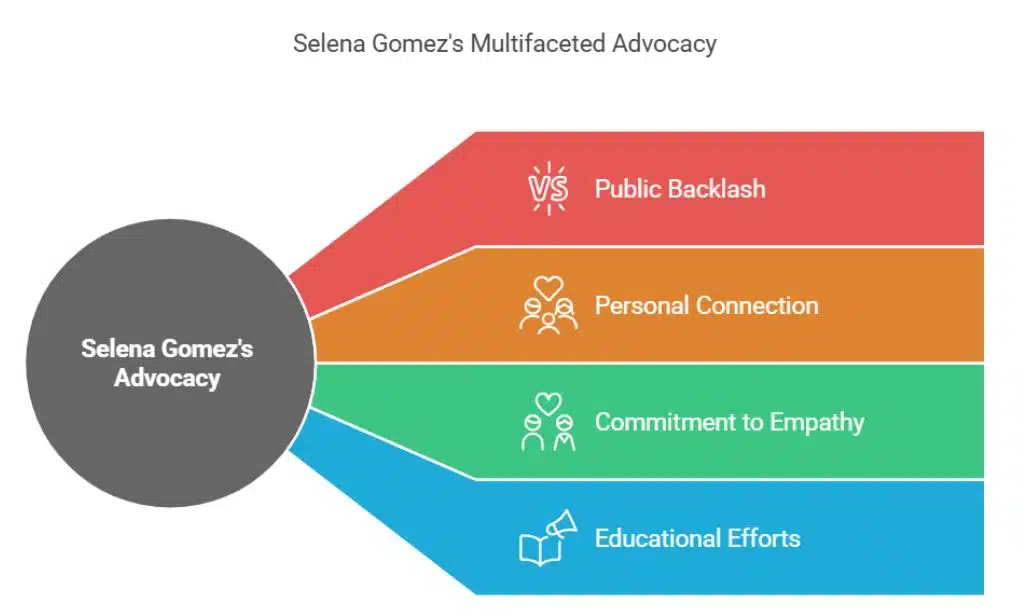In a recent and highly publicized exchange, the Trump administration has openly criticized actress and singer Selena Gomez following her emotional commentary on the government’s intensified immigration enforcement policies.
Selena Gomez’s Emotional Appeal
On January 27, 2025, Selena Gomez, a third-generation Mexican-American, took to Instagram to share a heartfelt video expressing her distress over the recent surge in deportations of undocumented immigrants. In the since-deleted video, Gomez tearfully stated, “All my people are getting attacked, the children. I don’t understand. I’m so sorry, I wish I could do something but I can’t.” This emotional plea highlighted her deep connection to the immigrant community and her concern over the administration’s actions.
Gomez’s advocacy for immigrant rights is well-documented. In 2019, she produced the Netflix documentary “Living Undocumented,” which shed light on the challenges faced by undocumented families in the United States. In an op-ed for Time magazine, she delved into her family’s own immigration story, emphasizing the importance of empathy and understanding in the national discourse on immigration.
The White House’s Direct Rebuttal
In an unprecedented move, the official White House social media accounts released a video on January 31, 2025, directly addressing Gomez’s emotional post. The video featured three mothers—Tammy Nobles, Alexis Nungaray, and Patty Morin—whose children were allegedly killed by individuals residing in the U.S. illegally. These women criticized Gomez’s sincerity and questioned her understanding of the complexities surrounding immigration enforcement. Nungaray remarked, “Seeing that video, it’s hard to believe it’s actually genuine and real because she’s an actress.” Morin added, “I just feel like it’s a ruse to deceive people and to garner sympathy for lawlessness.”
The video underscored the administration’s stance that their immigration policies are designed to protect American citizens from the dangers posed by undocumented immigrants with criminal histories. By highlighting the tragic stories of these mothers, the administration aimed to justify its stringent enforcement measures and counter narratives that portray such policies as lacking compassion.
Public Reaction and Backlash
The White House’s response ignited a firestorm of reactions across social media and traditional news outlets. Critics accused the administration of exploiting personal tragedies to undermine Gomez’s message of empathy. Actress Eiza González expressed her dismay, stating, “What the hell is happening? How is the White House official page posting this? Are you serious?”
Legal experts and human rights advocates also weighed in, arguing that the administration’s approach was a calculated attempt to silence dissent and discourage public figures from speaking out on contentious issues. Alicia Luncheon, a prominent civil rights attorney, commented, “This is a clear example of the government using its platform to intimidate and suppress opposing viewpoints. It’s a dangerous precedent.”
Selena Gomez’s Continued Advocacy
Despite the intense backlash, Gomez remained resolute in her advocacy for immigrant rights. In a follow-up Instagram Story, she wrote, “Apparently it’s not ok to show empathy for people.” This statement highlighted her frustration with the criticism she received and reaffirmed her commitment to standing in solidarity with marginalized communities.
Gomez’s involvement in immigration issues is deeply personal. In her 2019 Time magazine op-ed, she shared her family’s own immigration story, emphasizing the importance of compassion and understanding in the debate over immigration policies. She wrote, “I feel afraid for those in similar situations. Fear shouldn’t stop us from getting involved and educating ourselves on these issues.”
Context of the Immigration Crackdown
These events unfold against the backdrop of a significant escalation in immigration enforcement by the Trump administration. In the weeks following President Trump’s inauguration, U.S. Immigration and Customs Enforcement (ICE) reported over 7,000 arrests of undocumented individuals. The administration maintains that these actions target individuals with criminal histories to enhance public safety. However, critics argue that the broad scope of the raids has instilled fear in immigrant communities and led to the separation of families.
The administration has also introduced several policy changes aimed at strengthening immigration enforcement. Notably, President Trump signed the Laken Riley Act into law, granting federal authorities increased power to deport undocumented immigrants accused of crimes. Named after a slain Georgia nursing student, the bipartisan act mandates detention for immigrants charged with specific offenses and allows states to sue the federal government over immigration policy impacts. Critics argue that the law could lead to unjust detentions and constitutional violations.
Furthermore, the administration announced plans to detain up to 30,000 undocumented immigrants at Guantanamo Bay, a move that has been met with widespread backlash from rights groups, Democrats, and the Cuban government. Critics highlight Guantanamo’s history of human rights abuses and argue that using the facility for immigration detention is both inhumane and legally questionable.
Broader Implications
The exchange between Gomez and the White House underscores the deepening divide in the national conversation on immigration. It highlights the tension between calls for empathy and the government’s focus on law enforcement. The administration’s direct engagement with a celebrity critic is indicative of a broader strategy to confront and discredit opposing voices, particularly those with significant public influence.
This incident also raises questions about the role of public figures in political discourse. Gomez’s willingness to speak out on such a contentious issue reflects a growing trend of celebrities using their platforms to advocate for social justice causes. While some applaud these efforts, others argue that celebrities may lack the expertise to engage in complex policy debates.





































